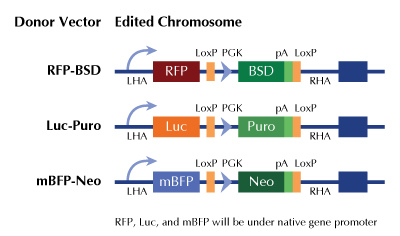Neuraminidase (NEU1) Human Gene Knockout Kit (CRISPR)
CAT#: KN200386LP
NEU1 - human gene knockout kit via CRISPR, HDR mediated
Functional Cassette: GFP-puro RFP-BSD mBFP-Neo
HDR-mediated knockout kit validation
USD 1,657.00
4 Weeks*
Specifications
| Product Data | |
| Format | 2 gRNA vectors, 1 Luciferase-Puro donor, 1 scramble control |
| Donor DNA | Luciferase-Puro |
| Symbol | Neuraminidase |
| Locus ID | 4758 |
| Components |
KN200386G1, Neuraminidase gRNA vector 1 in pCas-Guide CRISPR vector KN200386G2, Neuraminidase gRNA vector 2 in pCas-Guide CRISPR vector KN200386LPD, donor DNA containing left and right homologous arms and Luciferase-Puro functional cassette. GE100003, scramble sequence in pCas-Guide vector |
| Disclaimer | These products are manufactured and supplied by OriGene under license from ERS. The kit is designed based on the best knowledge of CRISPR technology. The system has been functionally validated for knocking-in the cassette downstream the native promoter. The efficiency of the knock-out varies due to the nature of the biology and the complexity of the experimental process. |
| Reference Data | |
| RefSeq | NM_000434 |
| UniProt ID | Q99519 |
| Synonyms | NANH; NEU; SIAL1 |
| Summary | The protein encoded by this gene is a lysosomal enzyme that cleaves terminal sialic acid residues from substrates such as glycoproteins and glycolipids. In the lysosome, this enzyme is part of a heterotrimeric complex together with beta-galactosidase and cathepsin A (the latter is also referred to as 'protective protein'). Mutations in this gene can lead to sialidosis, a lysosomal storage disease that can be type 1 (cherry red spot-myoclonus syndrome or normosomatic type), which is late-onset, or type 2 (the dysmorphic type), which occurs at an earlier age with increased severity. [provided by RefSeq, Jul 2008] |
Documents
| Product Manuals |
| FAQs |
| SDS |
Resources
Other Versions
| SKU | Description | Size | Price |
|---|---|---|---|
| KN200386 | NEU1 - human gene knockout kit via CRISPR, HDR mediated |
USD 1,657.00 |
|
| KN200386BN | NEU1 - human gene knockout kit via CRISPR, HDR mediated |
USD 1,657.00 |
|
| KN200386RB | NEU1 - human gene knockout kit via CRISPR, HDR mediated |
USD 1,657.00 |
|
| KN400386 | NEU1 - KN2.0, Human gene knockout kit via CRISPR, non-homology mediated. |
USD 1,657.00 |
|
| GA103173 | NEU1 CRISPRa kit - CRISPR gene activation of human neuraminidase 1 |
USD 1,657.00 |
{0} Product Review(s)
Be the first one to submit a review






























































































































































































































































 Germany
Germany
 Japan
Japan
 United Kingdom
United Kingdom
 China
China
